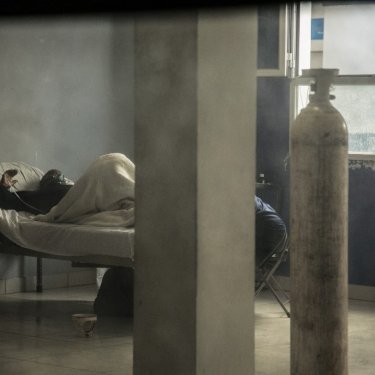RSF urges Madagascar to let journalists cover Covid-19 freely

Reporters Without Borders (RSF) calls on the authorities in Madagascar not to suppress media coverage of a second wave of coronavirus cases after they suspended nine radio and TV programmes last week and made several broadcasters give a written undertaking not to cause trouble in order to get their programmes back on the air.
The nine programmes were suspended under a state of emergency on 22 April on the grounds that they were “likely to disturb public order and security and undermine national unity.” Broadcast by a total of 14 different media outlets, they were either political discussion programmes or shows with live interventions by viewers or listeners.
Some of the programmes were allowed to resume broadcasting after a meeting four days later between the communication minister and representatives of some of the media outlets, who had to sign an undertaking that their programmes would “not include any incitement that could harm national unity, disturbance of public order, or incitement to revolt.”
Other media outlets such as the opposition TV channel MBS told RSF that they were not invited to the meeting and that they have filed a legal challenge to the 22 April suspension order.
When RSF asked communication minister Lalatiana Rakotondrazafy Andriatongarivo about the suspensions, she denied “any intention of censoring or obstructing the media” and insisted they were just a “measure to combat the pandemic.”
“The public health crisis must not be used as a pretext for prior restrictions on the freedom to inform,” said Arnaud Froger, the head of RSF’s Africa desk. “Preventing journalists from working and holding a critical debate constitutes censorship and reflects a desire to suppress communication, not to combat the pandemic.” Froger added: “The partial cancellation of this measure was a first step. We urge the Madagascan authorities to lift the suspension on all the targeted programmes, without exception and without conditions, and to allow journalists and media outlets to work freely, without any restrictions on access to information or their sources concerning the Covid-19 pandemic.”
Several journalists have told RSF they are finding it very difficult to cover the pandemic. They say it is hard to get figures for Covid-19 cases and deaths or get access to the health centres mobilised to combat the pandemic, and that some sources are afraid to talk.
The authorities already banned phone-in programmes during the first big wave of coronavirus cases last year, and ordered privately-owned radio and TV stations to provide live retransmission of the official bulletins about the pandemic that were being broadcast by the state media. Formal warning were issued in April 2020 to Real TV and other outlets that were not complying.
Madagascar has fallen three places in RSF's 2021 World Press Freedom Index and is now ranked 57th out of 180 countries.



